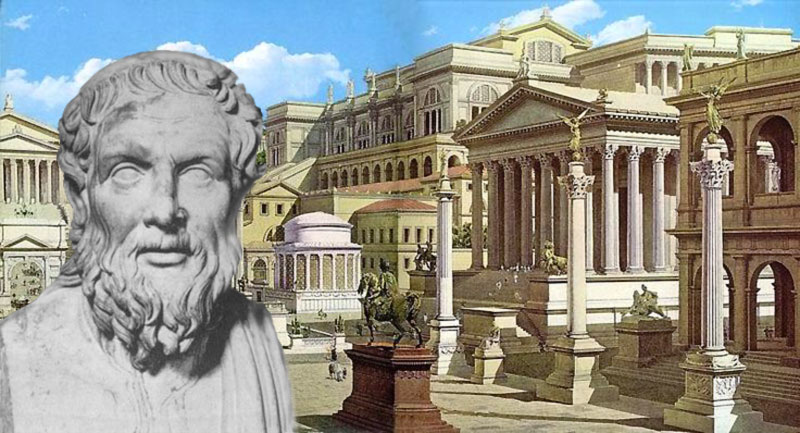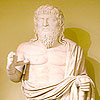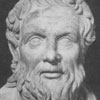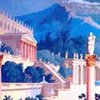Apollonius of Tyana
Apollonius of Tyana is virtually unknown today. Yet according to G. R. S. Mead, his biographer, “Apollonius of Tyana was the most famous philosopher of the Græco-Roman world of the first century.”
During a busy and influential lifetime, Apollonius was a traveler (ranging as far as India); an advisor to emperors; a sage with disciples; an author (none of whose works have survived); a healer; and a reformer who, says Mead, “devoted the major part of his long life to the purification of the many cults of the Empire and to the instruction of the ministers and priests of its religions.” He was also a visitor to the Inner Earth. For while in India, Apollonius descended to the Abode of the Wise Men and studied there. Apollonius was born to a wealthy family in Tyana, a town in Cappadocia (a Greek-speaking region of Asia Minor, in what is now central Turkey). A precocious child, he was educated initially by learned tutors. Then, at the age of fourteen, he was sent to study in nearby Tarsus. (Saul of Tarsus—the future Saint Paul—may have been around at the time.) But a year later Apollonius moved on to Ægeæ, a seaport in Cilicia, to study at the local temple of Asclepius.
The priests at the temple adhered to various philosophies. But it was to a Pythagorean that young Apollonius was drawn. And he was soon adopting the philosophy and lifestyle of Pythagoras.
As part of that lifestyle, Apollonius became a vegetarian, dressed plainly in white linen, wore his hair long and went barefoot, remained chaste, meditated, and gave away his property. But most notably, he took the Pythagorean oath of silence (the echemythia), vowing not to utter a single word for five years. And Apollonius kept his oath, allowing himself not even a murmur.
What were the benefits of Pythagoreanism? Later in life, Apollonius would send this letter to a rival philosopher:
To Euphrates: If someone associates with a true Pythagorean, what will he get from him, and in what quantity? I would say: statesmanship, geometry, astronomy, arithmetic, harmonics, music, medicine, complete and god-given prophecy, and also the higher rewards—greatness of mind, of soul, and of manner, steadiness, piety, knowledge of the gods and not just supposition, familiarity with blessed spirits and not just faith, friendship with both gods and spirits, self-sufficiency, persistence, frugality, reduction of essential needs, ease of perception, of movement, and of breath, good color, health, cheerfulness, and immortality. But what do those who see you come away with, Euphrates? (Translated by Christopher P. Jones)
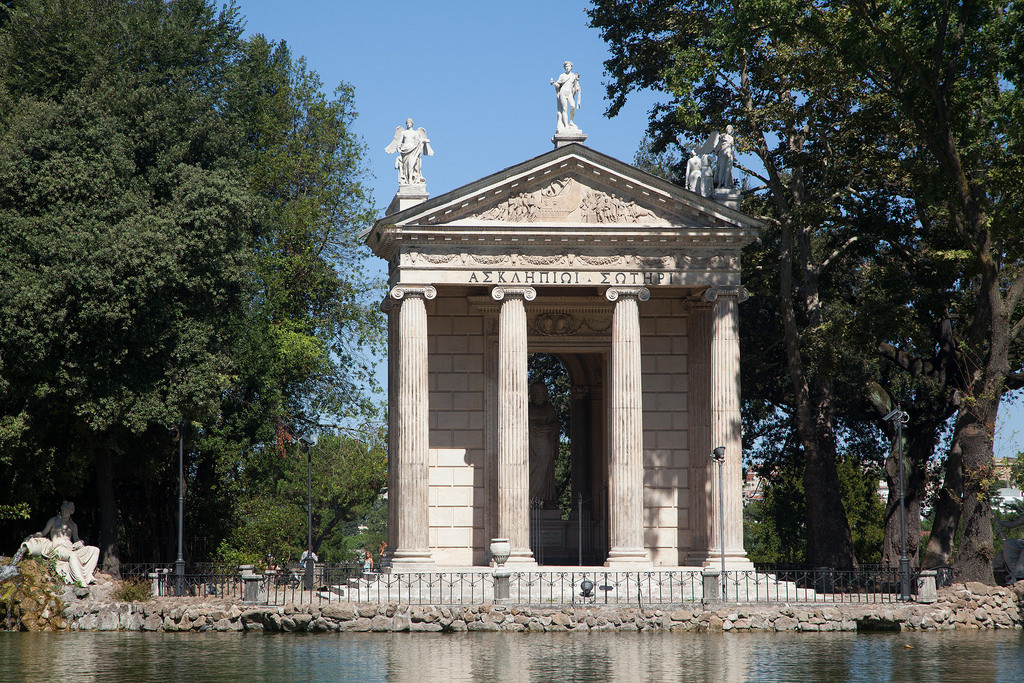 After five years of study and silence, Apollonius had completed the probationary period. He was now a full-fledged Pythagorean. And resuming the use of his voice, he became an eloquent spokesman for the philosophy. Acclaimed for his learning, he began to teach at the temple of Asclepius; lecture at other shrines; and acquire disciples.
After five years of study and silence, Apollonius had completed the probationary period. He was now a full-fledged Pythagorean. And resuming the use of his voice, he became an eloquent spokesman for the philosophy. Acclaimed for his learning, he began to teach at the temple of Asclepius; lecture at other shrines; and acquire disciples.
During this period his father died; and Apollonius came into a sizable inheritance. But deeming the possession of wealth to be unbefitting a Pythagorean, he gave most of it away to relatives. He did, however, retain a portion—to finance the travels upon which he was soon to embark.
There followed years of teaching throughout Asia Minor. And then he decided to journey to India. For like Pythagoras before him, he wished to visit the legendary Abode of the Wise Men and partake of their wisdom.
Apollonius began his journey in Antioch, accompanied by two servants. (One was a stenographer; the other, a calligrapher. Among their duties was to record his thoughts as he traveled.) His seven disciples had declined to accompany Apollonius, and had tried to dissuade him from making so arduous a journey. To which he had replied: “Since you are faint-hearted, I bid you farewell. As for myself, I must go where wisdom and my guardian spirit may lead me. The gods are my advisors and I can but rely on their counsels.”
But while passing through Hierapolis in Syria, he acquired another companion: a young man named Damis. “Let us go together—you will follow God, and I shall follow you!” said Damis, who would become his chief disciple and his Boswell.
Apollonius continued eastward, with Damis serving as guide and translator. They soon arrived at the Euphrates river—the border between the Roman and Parthian empires. A customs official asked if Apollonius had anything to declare.
“Moderation, Justice, Virtue, Temperance, Courage, and Endurance,” he replied.
“You must register these servants,” said the official, mistaking the feminine nouns for the names of slaves.
“That I cannot do,” said Apollonius, “since these are not my servants that I bring across the border, but my masters.”
Apollonius, Damis, and the two servants crossed the river and continued on to Babylon. They wound up staying there for eighteen months. During that time Apollonius studied with the Magi and was initiated into their mysteries. He also became a confident of the king, to whom he explained the Pythagorean lifestyle; offered advice on ruling; and talked about the nature of the soul—talks so enlightening that the king ceased to fear death.
Finally it was time to resume their journey. The king gave Apollonius camels, provisions, and a guide. And he asked what gift the philosopher would bring back to him from India.
“A fine gift, O king,” said Apollonius. “For if my meeting with those men makes me wiser, so will I return to you a better man than I am now.”
“Just return to me,” said the king, tearfully embracing him. “That will be a fine gift.” And Apollonius departed from Babylon. He had camels now, and—displayed on the lead camel—the protective insignia of a king.
His route took him and his companions through the Caucasus. There they passed the mountain where Prometheus had been chained. (Locals showed them the remains of the chains.) And one moonlit night, they were set upon by an empusa, or vampire. (Apollonius repelled it with a rebuke.) But for the most part, the journey through Central Asia was uneventful; and Apollonius and Damis passed the time by engaging in philosophical discussions.
Then one day they began to see men riding on elephants, and realized they had reached India. Crossing the Indus river, they arrived in the capital city of Taxila. And there, for three days, they were the guests of King Phraotes.
Despite his wealth, Phraotes lived a life of moderation and restraint. A devotee of philosophy, he was honored to host a philosopher; and during one of their talks he asked Apollonius: “In Greece would you deign to accept me as a guest?”
“What do you mean?” said Apollonius.
“Because I consider you far superior to myself; wisdom is greater than royal rank.”
On the morning of Apollonius’s departure, Phraotes provided him with a new guide. He also gave him a letter of introduction—to Iarchas, head of the Abode of the Wise Men. The letter began:
King Phraotes greets Iarchas and his company of sages. Apollonius, a very wise man, considers you wiser than himself, and comes to learn from you. Dismiss him not, therefore, without a knowledge of that which you know. Thus shall your wisdom not be lost, for no one speaks better or remembers better than he.
Setting out from Taxila, Apollonius and his companions crossed the Hyphasis river. (A monument on the bank marked the spot where Alexander and his army had turned back.) They pressed on, prodding their camels through marshland (home to a species of unicorn, Philostratus tells us)—across a mountain (where monkeys were used to harvest pepper trees)—through rich farmland (irrigated by canals that brought water from the Ganges).
Then their guide began to shake with fear. For they were nearing the Abode of the Wise Men; and its residents were viewed by the Indians with awe and trepidation.
Suddenly a young man came running toward them. He carried a golden rod: the emblem of a messenger. Approaching the travelers, he greeted them in Greek. And he announced that Apollonius, unaccompanied by the others, was to come with him.
“For they themselves have invited you.” Leaving his servants and Damis behind, Apollonius followed the messenger. And though practiced, as a Pythagorean, in the control of his emotions, he was visibly excited.
The messenger took him to a hill that was enveloped by a cloud—a thick mist that hid all but the summit. He led Apollonius into the cloud and through a gate. And they descended into the Abode of the Wise Men.
They made their way through a series of dim tunnels. Along the way was a well that glowed with a bluish light…a fiery crater (the Fire of Forgiveness)…the Jar of Rains and the Jar of Winds (used by the Wise Men to influence the weather)…a variety of idols (representing Indian, Egyptian, and Greek gods). Despite having a guide to follow, Apollonius tread warily. And he was led into the main hall of the Abode.
The Wise Men—eighteen of them—were seated in a circle. They were elderly men with turbans and beards. They wore tunics that left one arm and shoulder bare. Each was holding a staff. Several of the sages rose as Apollonius entered, and came forward to embrace him.
The head Wise Man, Iarchas, was seated on a throne. He greeted Apollonius in Greek, and asked to see the letter of introduction. (Clairvoyant, he was aware of its existence, though apparently not of its contents.) Apollonius passed the letter to him.
Iarchas read it, nodded approvingly, and asked the reason for his coming. Apollonius gave a satisfactory answer. Whereupon, Iarchas smiled and invited him to attend their daily rites.
“Well now,” said Apollonius, “I should certainly be wronging the Caucasus and the Indus, which I crossed to get here, if I did not witness your rites.”
The Wise Men rose and made their way to a purification chamber. Apollonius followed after them. In the chamber they bathed, decked themselves with garlands, and chanted.
Still chanting, they filed into a temple. A fire was burning on the altar. They assembled before it and began to pound the floor with their staffs.
And like a troupe of magical acrobats, the Wise Men rose several feet into the air.
Apollonius watched in amazement, as they levitated and sang hymns of praise to the gods. Then they returned to the hall and settled into their seats. And Iarchas offered to answer any questions that Apollonius might have. “Ask away,” he said, “as you have come among Masters who have knowledge of all things.”
“Do you have self-knowledge?” asked Apollonius.
“Of course!” replied Iarchas. “We are able to know all things because we began by knowing ourselves. Otherwise, we would not have dared to embark upon the quest for philosophical knowledge.”
A lengthy conversation ensued, touching on such topics as virtue, the nature of the soul, and Homer. Afterwards a banquet was held.
Apollonius spent four months with the Wise Men. During that time he learned their doctrines and absorbed their wisdom. Eventually, Damis too was allowed to attend the philosophical discourses and the rites in the temple. Witnessing the levitation of the Wise Men, his eyes fairly popped.
Finally it was time for Apollonius to depart. Iarchas provided him with camels and a guide, and presented him with seven healing rings—one for each planet and day of the week.
Ten days later Apollonius and his companions reached the sea, and boarded a ship that was bound for Babylon.
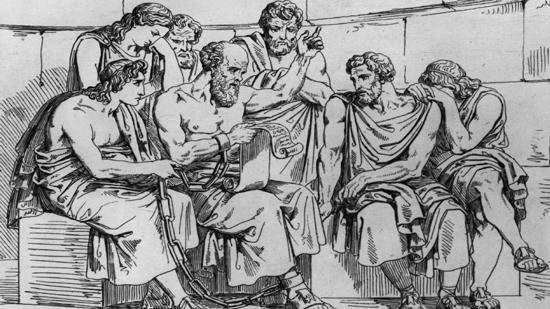 In the decades that followed, Apollonius of Tyana rose to prominence. Combining the wisdom of the East with that of Pythagoras, he became the foremost philosopher of the Græco-Roman world. And he continued to travel. For he saw himself now as having a mission: the restoration of religious practices to their original purity. “I shall never forget my Masters,” he said of the Wise Men, “and journey through the world teaching what I have learned from them.”
In the decades that followed, Apollonius of Tyana rose to prominence. Combining the wisdom of the East with that of Pythagoras, he became the foremost philosopher of the Græco-Roman world. And he continued to travel. For he saw himself now as having a mission: the restoration of religious practices to their original purity. “I shall never forget my Masters,” he said of the Wise Men, “and journey through the world teaching what I have learned from them.”
His fame and influence grew. Cities summoned him, to instruct their priests in the proper conduct of ritual. (Among the reforms that he advocated: the cessation of animal sacrifice.) And he busied himself with the standard duties of a sage: healing, interpreting dreams, installing talismans—and, of course, teaching and preaching. With his disciples he discussed matters both mundane and meta-physical. Nothing escaped his scrutiny, from the challenges of daily life to the nature of the soul. And always at his side was Damis, recording his words and deeds.
The Peripatetics were philosophers who supposedly walked as they talked; and Apollonius carried the practice to new heights. He was probably the greatest traveler of antiquity, roaming the length and breadth of the Roman Empire. He would lodge at temples, inns, and the homes of dignitaries. G. R. S. Mead lists the many places he visited (including the Upper Nile retreat of the Gymnosophists, or Naked Philosophers), and observes:
Such then is the geographical outline, so to say, of the life of Apollonius, and even the most careless reader of the bare skeleton of the journeys recorded by Philostratus must be struck by the indomitable energy of the man, and his power of endurance.
Yet Apollonius was not just a wandering sage. He also served as an advisor to emperors—in particular Titus and Vespasian. He lectured them on the duties of a wise ruler; and the emperors paid attention to him. Said Titus: “I have indeed captured Jerusalem, but you, Apollonius, have captured me.”
And like any philosopher, he wrote books—among them a life of Pythagoras, a treatise on sacrifices, and a treatise on divination. (Nothing has survived of these works save fragments.) Yet despite his intellectual acuity, Apollonius remained at heart a simple, pious man—one who thrice daily prayed to the sun.
He lived to be nearly a hundred years old. At that time he was still teaching, at a temple in Ephesus—the conclusion to a long and illustrious career as a philosopher.
Here are some comments on that career:
There stands, in undiminished greatness, the image of a prophet and reformer. A man who strove for knowledge and self-improvement, and for the betterment of mankind. (Harry C. Schnur)
[His] one idea seems to have been to spread abroad among the religious brotherhoods and institutions of the Empire some portion of the wisdom which he had brought back from India. (G. R. S. Mead)
From Apollonius I have learned freedom of will and understanding, steadiness of purpose, and to look to nothing else, not even for a moment, except to reason. (Emperor Marcus Aurelius)
But let Apollonius speak for himself on the calling of a philosopher. He and Damis were once visiting the island of Rhodes. As they viewed the Colossus of Rhodes, a towering statue of the god Helios, Damis said: “Can anything be greater than this?”
“Yes,” said Apollonius. “A true man who pursues wisdom honestly and sincerely.”
Such a man was Apollonius of Tyana—the very model of a philosopher.
Yet a curious fact is this: Philostratus portrays him also as a magician. He attributes to Apollonius supernatural doings —prophesies, exorcisms, miraculous healings, a resurrection, sudden disappearances, an encounter with the ghost of Achilles, and the like. How much of this Philostratus took from the diary of Damis, and how much is apocryphal —legendary material that had accrued to the life of a sage— is impossible to determine. (Much of it, I suspect, is apocryphal.) In any case, the portrayal of Apollonius as a magician was responsible for the controversy that has surrounded him, and contributed to the eclipse of his fame. Here are some criticisms of the magical aspects of the Life:
[Apollonius’s life] is related in so fabulous a manner by his disciple that we are at a loss to discover whether he was a sage, an impostor, or a fanatic. (Historian Edward Gibbon)
We should deem it impertinent to direct argument against a mere romance and to subject a work of imagination to a grave discussion. (Cardinal Newman)
It would not surprise if, in the feverish religious atmosphere of the Severan court, Philostratus had turned a remarkable but not exceptional Pythagorean teacher of the first century into a holy man for a new age. (Translator Christopher Jones)
But let G. R. S. Mead—Theosophist and secretary to Madame Blavatsky—have the final word:
Was Apollonius, then, a rogue, a trickster, a charlatan, a fanatic, a misguided enthusiast, or a philosopher, a reformer, a conscious worker, a true initiate, one of the earth’s great ones? This each must decide for himself, according to his knowledge or his ignorance.
I for my part bless his memory, and would gladly learn from him.
See Apollonius Of Tyana by Philostratus (full book download) here.
Posted in True History of Manwith comments disabled.

